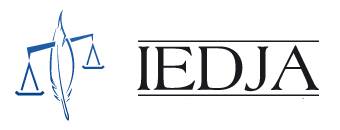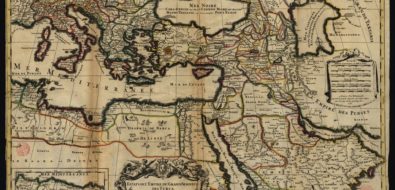Dr. Sara Razai, Program Director at IEDJA, will be participating in the High-Level Meeting of the Global Judicial Integrity Network (24-27 February 2020, Doha, Qatar) https://www.unodc.org/ji/index.html?lf_id=. She will be speaking about Special Processes for the Reassessment and Removal of Judges in the Context of Constitutional Transitions. This is part of a project that she is working on with the […]
Dr. Sara Razai, program director, Jurisdiction over cases in Western democracies is generally described as either concentrated into a unitary system of courts or fragmented into a plurality of different courts with their own separate hierarchical structures.1 In contrast with a unitary system of courts with a wide dispersal of jurisdictional powers, fragmented systems tend […]
Dr Sara Razai, Programme Director IEDJA This article explores the judicial role in the region from the 19th century, focusing on the impact of the Western law to the region with emphasis on the Ottoman legal reforms in the Arab region between 1839 – 1876 and the period following the Ottoman decline in the 20th […]
Sara Razai, Fellow researcher, In principle, judges are required to keep a distance from the community. For instance, under the fourth principle of the Sharjah Convention, Arab judges are instructed to maintain a balance between their judicial duties and their engagement in society.1 However, in practice judges are not insulated from society: they remain part […]
Dr. Sara Razai, Program Director at IEDJA, will be participating in the High-Level Meeting of the Global Judicial Integrity Network (24-27 February 2020, Doha, Qatar) https://www.unodc.org/ji/index.html?lf_id=. She will be speaking about Special Processes for the Reassessment and Removal of Judges in the Context of Constitutional Transitions. This is part of a project that she is working on with the […]
Dr. Sara Razai, program director, Jurisdiction over cases in Western democracies is generally described as either concentrated into a unitary system of courts or fragmented into a plurality of different courts with their own separate hierarchical structures.1 In contrast with a unitary system of courts with a wide dispersal of jurisdictional powers, fragmented systems tend […]
Dr Sara Razai, Programme Director IEDJA This article explores the judicial role in the region from the 19th century, focusing on the impact of the Western law to the region with emphasis on the Ottoman legal reforms in the Arab region between 1839 – 1876 and the period following the Ottoman decline in the 20th […]
Sara Razai, Fellow researcher, In principle, judges are required to keep a distance from the community. For instance, under the fourth principle of the Sharjah Convention, Arab judges are instructed to maintain a balance between their judicial duties and their engagement in society.1 However, in practice judges are not insulated from society: they remain part […]
Junior Expert in Communication & Media for the EU program « Support to the Rule of Law in Jordan » Junior Expert in Planning & Developmentfor the EU program « Support to the Rule of Law in Jordan »
Sara Razai, The Lebanese legal system recognises the equal access to justice and courts, including the provision of legal aid for those who otherwise lack the necessary means. While in principle, there is a legal right to access courts in Lebanon – a fundamental and unconditional right – a number of obstacles hinders this to […]
Bamdad SHAMS, We live in a more globalized world in which the states lose their normative power for regulating transnational private relations1. The ultimate consequence of this is that the multinational corporations (MNCs) creating their own legal orders2, their own norms3 such as private standards and codes of conduct4 for their own behaviour (and their […]
Dr. APOSTOLOS ANTHIMOS, Legal Expert in the field of International Litigation Άρειος Πάγος, i.e. the Hellenic Supreme Court, issued its first ruling on the immunity of foreign states against execution. The judgment follows the path introduced by the German Constitutional Court in the famousPhillipinische Botschaft case from 1977 [SC 29.11.2017, decision nr. 1937/2017, unreported] THE FACTS Appellant: […]
Our web-based legal forum is an original and innovative project that aims to facilitate and promote intellectual exchanges across the legal spectrum. We invite practitioners such as judges, researchers, lawyers and academics to come together and discuss legal issues that are pervasive in the region. Access to law and justice This topic explores the […]
APOSTOLOS ANTHIMOS, Legal Expert with a Ph.D. in the field of International Litigation The Hellenic Republic is the sole EU Member State which provides for the application of Sharia law in its territory for more than a century. A recent amendment is granting Greek Moslems the right to opt-out, and resort to domestic civil law. At […]
Mohamed. M. Youssef, Chief judge, member of the Technical Office, Court of Cassation “Supreme Court of Egypt”. Courtroom Judge, Court of 1st instance, Civil & Criminal divisions. (October 2007 – September 2011). Assistant Prosecutor, the Public Prosecution Bureau. (March 2001 – September 2007). Master of Laws in International and Comparative Law (LL.M), Indiana University, Robert […]











